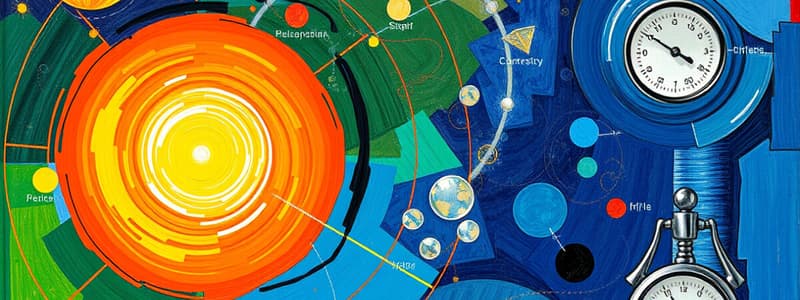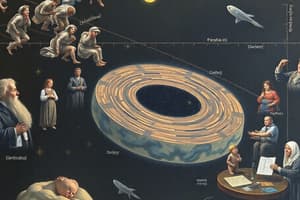Podcast
Questions and Answers
What is the first step in the scientific method?
What is the first step in the scientific method?
form a hypothesis.
What does the heliocentric theory propose about the center of the universe?
What does the heliocentric theory propose about the center of the universe?
the sun
How did barometers advance science?
How did barometers advance science?
They allowed scientists to measure pressure.
What field did Euclid contribute to in ancient Greece?
What field did Euclid contribute to in ancient Greece?
What is one difference between Robert Boyle and Isaac Newton?
What is one difference between Robert Boyle and Isaac Newton?
What does the geocentric theory propose about the center of the universe?
What does the geocentric theory propose about the center of the universe?
Who discovered the three laws of planetary motion?
Who discovered the three laws of planetary motion?
The telescope allowed scientists to disprove the heliocentric theory and other ideas.
The telescope allowed scientists to disprove the heliocentric theory and other ideas.
One result of the Scientific Revolution was the ______, which was a new way to solve problems and conduct research.
One result of the Scientific Revolution was the ______, which was a new way to solve problems and conduct research.
How did French philosopher René Descartes contribute to the Scientific Revolution?
How did French philosopher René Descartes contribute to the Scientific Revolution?
Flashcards are hidden until you start studying
Study Notes
The Scientific Revolution Overview
- The scientific method begins with forming a hypothesis, a crucial first step in systematic inquiry.
- The heliocentric theory, proposed by Copernicus, posits that the sun is at the center of the universe, a significant shift from earlier beliefs.
- Barometers advanced scientific understanding by enabling the measurement of atmospheric pressure, facilitating innovations in meteorology and physics.
- Ancient Greek mathematician Euclid made substantial contributions to mathematics, laying foundational principles still utilized today.
Key Figures and Theories
- Robert Boyle is noted for discovering the relationship between pressure and gas volumes, which is fundamental to modern chemistry.
- Isaac Newton is renowned for his formulation of the law of gravity, explaining the attraction between masses.
- The geocentric theory attributed the center of the universe to Earth, dominating earlier astronomical models before the acceptance of heliocentrism.
- Johannes Kepler is recognized for his discovery of the three laws of planetary motion, which describe the orbits of planets around the sun.
Technological Impacts
- The telescope was pivotal in the Scientific Revolution, as it provided evidence that supported the heliocentric theory while also challenging existing notions about the universe.
- The Scientific Revolution introduced the scientific method, a systematic approach to problem-solving and research that replaced traditional ways of thinking.
Philosophical Contributions
- René Descartes, a French philosopher, contributed to the Scientific Revolution by developing mathematical principles, influencing the fields of algebra and geometry.
Studying That Suits You
Use AI to generate personalized quizzes and flashcards to suit your learning preferences.




